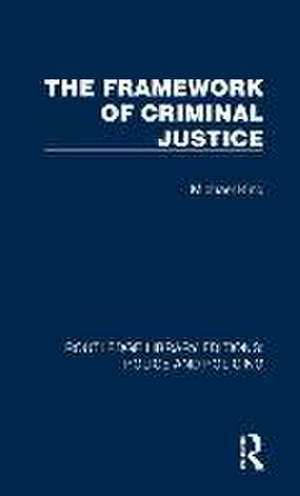The Framework of Criminal Justice: Routledge Library Editions: Police and Policing
Autor Michael Kingen Limba Engleză Hardback – 31 mar 2023
Din seria Routledge Library Editions: Police and Policing
- 15%
 Preț: 700.95 lei
Preț: 700.95 lei - 15%
 Preț: 667.32 lei
Preț: 667.32 lei - 15%
 Preț: 706.04 lei
Preț: 706.04 lei - 15%
 Preț: 663.75 lei
Preț: 663.75 lei - 15%
 Preț: 695.54 lei
Preț: 695.54 lei - 15%
 Preț: 703.84 lei
Preț: 703.84 lei - 15%
 Preț: 665.04 lei
Preț: 665.04 lei - 18%
 Preț: 783.69 lei
Preț: 783.69 lei - 15%
 Preț: 696.27 lei
Preț: 696.27 lei - 15%
 Preț: 703.48 lei
Preț: 703.48 lei - 15%
 Preț: 696.98 lei
Preț: 696.98 lei - 18%
 Preț: 784.07 lei
Preț: 784.07 lei - 15%
 Preț: 702.43 lei
Preț: 702.43 lei - 18%
 Preț: 782.44 lei
Preț: 782.44 lei - 15%
 Preț: 704.05 lei
Preț: 704.05 lei - 15%
 Preț: 699.14 lei
Preț: 699.14 lei - 15%
 Preț: 709.96 lei
Preț: 709.96 lei - 15%
 Preț: 666.59 lei
Preț: 666.59 lei - 15%
 Preț: 672.25 lei
Preț: 672.25 lei - 15%
 Preț: 663.10 lei
Preț: 663.10 lei - 15%
 Preț: 695.54 lei
Preț: 695.54 lei - 15%
 Preț: 715.01 lei
Preț: 715.01 lei - 34%
 Preț: 11887.50 lei
Preț: 11887.50 lei - 15%
 Preț: 701.60 lei
Preț: 701.60 lei
Preț: 671.28 lei
Preț vechi: 789.74 lei
-15% Nou
Puncte Express: 1007
Preț estimativ în valută:
128.44€ • 134.12$ • 106.07£
128.44€ • 134.12$ • 106.07£
Carte tipărită la comandă
Livrare economică 15-29 aprilie
Preluare comenzi: 021 569.72.76
Specificații
ISBN-13: 9781032421667
ISBN-10: 1032421665
Pagini: 178
Dimensiuni: 138 x 216 mm
Greutate: 0.49 kg
Ediția:1
Editura: Taylor & Francis
Colecția Routledge
Seria Routledge Library Editions: Police and Policing
Locul publicării:Oxford, United Kingdom
ISBN-10: 1032421665
Pagini: 178
Dimensiuni: 138 x 216 mm
Greutate: 0.49 kg
Ediția:1
Editura: Taylor & Francis
Colecția Routledge
Seria Routledge Library Editions: Police and Policing
Locul publicării:Oxford, United Kingdom
Public țintă
Postgraduate, Professional, and UndergraduateCuprins
New Preface for Reissue. Acknowledgements. 1. Understanding the Criminal Justice Process 2. Theoretical Approaches to Criminal Justice 3. The Formal Process 4. Scenes in the Criminal Justice Process 5. Making Sense of the System 6. Getting the System Right: The Process of Law Reform 7. Bibliography. Index.
Recenzii
"In the four decades since this book appeared, few scholars have written about the criminal justice system in such a succinct yet insightful way. In the same period, the criminal justice system has generated many more controversies and we have witnessed deepened divisions of opinion regarding the system’s means, impacts and objectives. Michael King’s book offers a set of theoretical lenses still useful for teasing out and challenging our thinking about what is wrong now, and what might be done to change things for the better."
Andrew Goldsmith, Matthew Flinders Distinguished Emeritus Professor of Criminology, Flinders University, and Visiting Fellow, School of Regulation and Global Governance, Australian National University.
Andrew Goldsmith, Matthew Flinders Distinguished Emeritus Professor of Criminology, Flinders University, and Visiting Fellow, School of Regulation and Global Governance, Australian National University.
Notă biografică
Michael King is now an Emeritus Professor of the Law School, University of Reading. In this, his first book, he brings together his experiences while acting as a solicitor in magistrates' courts around London and the West Midlands in the 1970s with his study of social theory undertaken for a Master's dissertation at Warwick University. Since its publication, he has written many books and articles mainly about children and society's efforts to protect them from harm and promote their welfare. In recent years his academic work has concentrated on expounding, applying and translating the works of the acclaimed social theorist, Niklas Luhmann.
Descriere
In this title, first published in 1981, the criminal justice process is analysed by using six models, each of which expresses a different justification for criminal justice and punishment. The study examines the formal rules and procedures of the magistrate court system within the context of these models.
